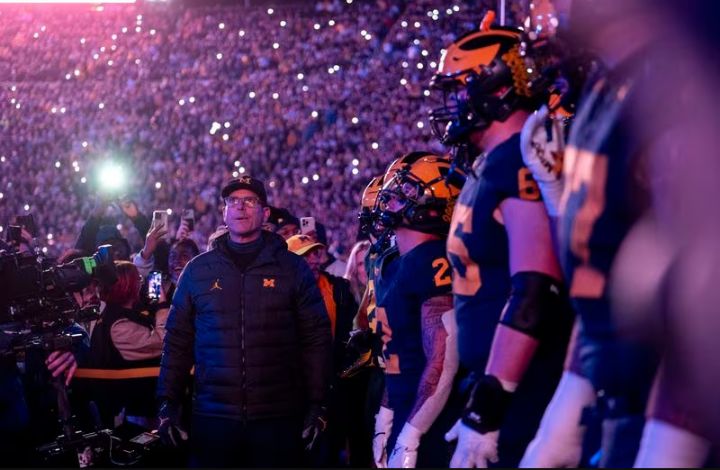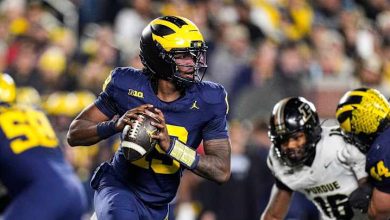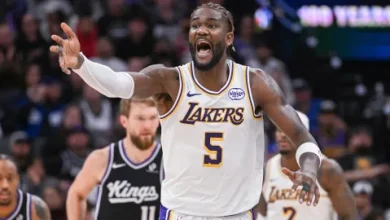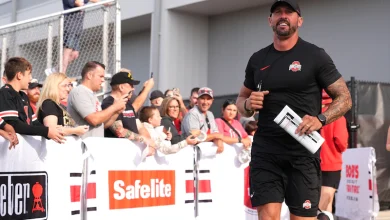How Jim Harbaugh built a national champion at Michigan

Michigan vs. Purdue college football
Michigan Wolverines head coach Jim Harbaugh prepares to lead the team onto the field before Michigan faces Purdue at Michigan Stadium in Ann Arbor on Saturday, Nov. 4, 2023.Jacob Hamilton | jhamilt3@mlive.com
Last December, in the days leading up to Michigan’s disappointing Fiesta Bowl loss to Texas Christian, I asked Jim Harbaugh about the disastrous 2020 season that changed everything.
The Wolverines were back-to-back Big Ten champions and playing in their second straight College Football Playoff semifinal. Things had turned around for the better. Winning had grown contagious and Harbaugh, desperate to claim college football’s top prize, was eager to praise those he worked with and the players who had bought in.
He even threw around bumper-sticker slogans like “the time is now” to help vocalize his sense of urgency, unbeknownst to the public of what lied ahead.
“I don’t think we needed it,” Harbaugh said, effectively shooting down the pretense of the question. “I looked at the pandemic year on a grand scale. If your organization wasn’t really anything good, you’re going to be wiped out. If it was good, you’d survive, you know? But if you have a great organization, then it’s going to not only survive but flourish and thrive.”
You would have been hard-pressed to find anyone describe the state of Michigan football in 2020 as “great” or even “good.” In the years after, players described a broken culture, a disjoined and uninterested locker room, and losses were piling up. Looking back, whether Harbaugh was willing to admit it at the time, but it served as a launching paid for himself — to reintroduce the physical, tough brand of football that he had won with. He responded by making wholesale changes to his coaching staff, an effort to bring in his fresh blood and new ideas, and it started with a call to Baltimore.
His brother, John, had built up a Ravens franchise known for its tough-as-nails approach and stingy defense, a unit led by coaching gurus Dean Pees and Don “Wink” Martindale and with a group of young, smart up-and-comers learning underneath. Harbaugh wanted to bring a variation of the Ravens’ defense to Ann Arbor, his last-ditch effort to slow the high-powered Ohio State offense and turn his fortunes around.
A deal was brokered to bring the Ravens’ 33-year-old linebackers coach, Mike Macdonald, over to install a package of intricate, varied looks, disguises and unpredictability. While Macdonald only spent one season in Ann Arbor — but it was long enough to build the foundation for which Jesse Minter, Michigan’s current d-coordinator and another Ravens assistant, would take over in 2022.
“No. 1 defense in the country, top-5, etc. but is it set up to beat the team that you know you have to beat, that you’re going to play in the last game of the season every year?,” Minter said of the task placed in front of him. “When I interviewed here, it was like, ‘How are you going to beat Ohio State?’”
During a four-year stretch from 2017 to ‘20, one could argue that Jim Harbaugh had lost his identity as football coach. His physical, ground-and-pound style of football had slowly gravitated toward a modern, up-tempo version of the spread offense designed to move quickly and score points. Which works if you’re churning out efficient and productive drives — but that wasn’t always the case.
Michigan football
Michigan head coach Jim Harbaugh fist bumps Michigan running back Blake Corum (2) after winning the national championship at NRG Stadium in Houston on Monday, Jan. 8, 2024. Neil Blake | MLive.comNeil Blake | MLive.com
Michigan’s antiquated, predictable man-to-man defense in a tough spot against some of the Big Ten’s best offenses. When the unit broke down in big games, unable to keep up with elite speed or a scheme that attacked the heart of what the Wolverines were trying to do, they often gave up a bunch of points and lost. A complementary, give-and-take style of ball was required, and Harbaugh believed he had found it — prompting him to infamously bellow during the summer of 2021, as pressure mounted and he accepted a revised contract from Michigan that effectively halved his pay, that he was going to “beat Ohio State or die trying.”
“We kind of all just had that common goal of trying to get to where we are now,” sixth-year linebacker Michael Barrett said. “And just being locked into that and playing for each other, playing for Coach Harbaugh, knowing the kind of guy he is. He’s the kind of guy you want to go win for. He’s trickled that throughout the system, through the coaches, through the players.”
That ‘21 season helped lay the groundwork for what was to come. Players described a new, brash attitude that saw real leaders emerge. A military-style approach behind the scenes called for players to neatly organize their shoes in a straight line and keep up cleaning their locker. The new-look coaching staff also cooked up some basic, fundamental tenets that Harbaugh demanded: A tough, rugged offense that could run the football, dominate the line of scrimmage and control clock. If all went according to plan, Harbaugh and his staff figured, it would take some of the load off a defense that had some stars and experience but lack of depth.
Edge rushers Aidan Hutchinson and David Ojabo terrorized opposing offensive lines and one win turned into two, Michigan finally got off the snide in Madison and piled up road win after road win. It all came to a head in late-November, in Ann Arbor, when Michigan scored a rivalry-flipping win over Ohio State, a precursor to the program’s first Big Ten title since 2004, first-ever CFP berth — and the success that was to come.
“Every college football team in the offseason tells themselves that we are good enough to win a national championship,” receiver-turned-defensive back Mike Sainristil said. “The difference is the work that you put in every single day; it’s the consistency that you have throughout the offseason, throughout the season. It’s the sacrifices you make, and that’s what we have done. We have sacrificed.”
The Wolverines were able to replicate all that and more in 2022, adding a win over in-state rival Michigan State to the resume, completing a perfect 12-0 regular season, a Big Ten title and return to the semifinals. By that point, however, the NCAA had begun to circle. The nation’s governing body over college athletics had opened an investigation into Michigan over Level II rules violations pertaining to recruiting and improper use of its coaches. NCAA officials also hit Harbaugh with a more serious Level I violation for failing to cooperate.
Even so, Harbaugh and the Wolverines trudged forward in 2023 as the preseason Big Ten favorite with star running back Blake Corum, quarterback J.J. McCarthy and a group of returning starters, all of whom set the table for the player-driven “national title-or-bust” moniker. Harbaugh served a three-game suspension to open the season, yet Michigan still cruised to a 7-0 start, besting its Big Ten opponents by an average of 37 points per game. Then came the real hammer.
On Oct. 19, the Big Ten Conference issued an unprecedented statement, informing the public and the rest of the college football world that Michigan was under a second NCAA investigation for “allegations of sign stealing.” Sign stealing has been around in football forever, according to reports, but opponents believed the Wolverines were going to extraordinary means to gather data and use it in games. The Big Ten would convene its own investigation and determine that Michigan had violated the league’s sportsmanship policy and suspended Harbaugh for the final three games of the regular season.
But even without their head coach on the sideline, Michigan leaned on a coaching staff largely built by Harbaugh in the post-pandemic era and players who bought into the culture of winning to continue on their tear. The Wolverines beat in-state rival Michigan State 49-0, followed it up with a 41-13 win over Purdue, beat Penn State on the road and made enough plays on defense to make it three-in-a-row over Ohio State. Despite the occasional struggle offensively, the story of 2023 was Michigan’s No. 1-ranked defense.
A group that includes zero projected first-round NFL draft picks but a collection of players with various experience levels and skillsets, many of them making plays in big moments. It was the complementary style of play that Harbaugh had grown up in, touted during his early years as coach and hoped to restore in Ann Arbor. While the Michigan offense ranked just 69th in the country this year in yards per game (382.7), it made up for it in yards per play (6.21, T-35th) and having one of the nation’s most efficient quarterbacks. The Wolverines played a modern, aggressive brand of football on defense and a safe, effective style on offense, daring opponents to line up and stop them.
This year, against a down Big Ten and college football landscape that had more parity than in seasons past, it worked. It not only worked but delivered Harbaugh and Michigan its first national title since 1997.
Maybe Harbaugh was right when he insinuated that his program was still “great” in 2020.
“It’s been a team effort all the way,” Harbaugh said Tuesday morning, less than 12 hours after his Michigan team hoisted the CFP trophy. “Nothing fancy. No surprises. Just old-fashioned, roll-up-your-sleeve hard work and teamwork, and it’s been a beautiful thing. So often the goal is chasing perfect, and it’s hard to be perfect. It rarely comes around. You hope to achieve excellence along the way.
“But, gosh, it’s perfect. It was a perfect 15-0.”





